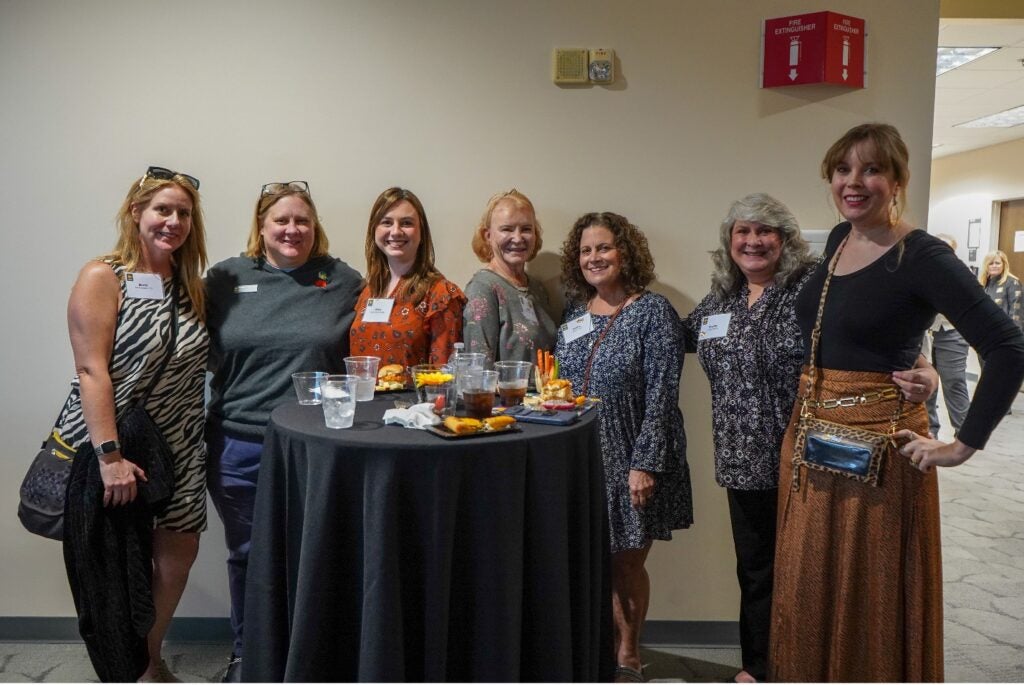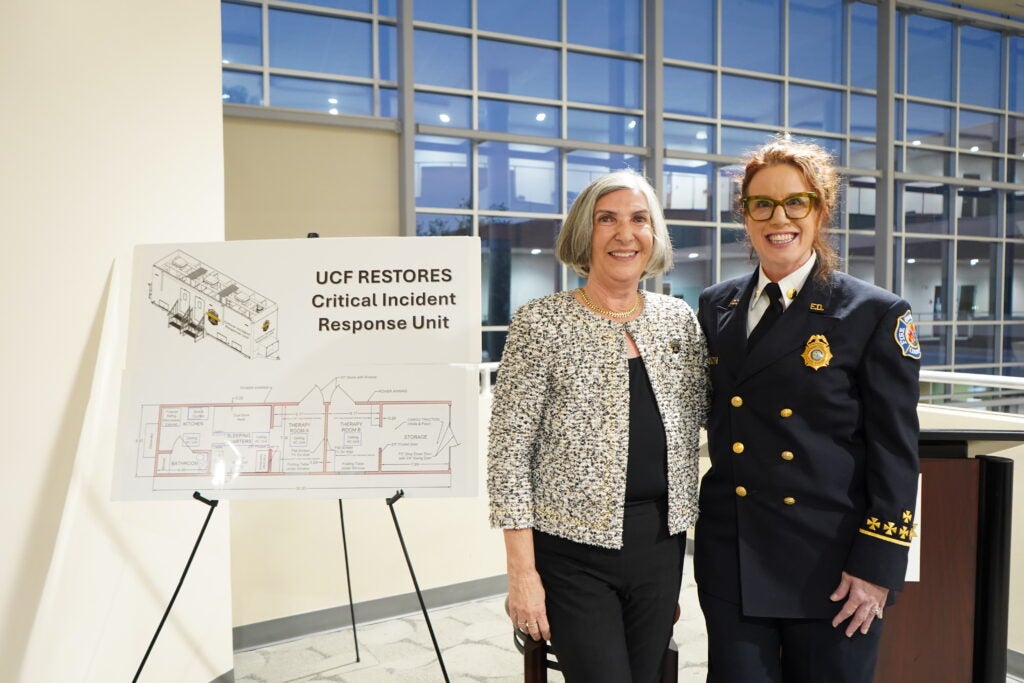Women Supporting Science Event Showcases UCF RESTORES’ Cutting-Edge Technology and Treatment for First Responders
Community of local alumni, philanthropists, and volunteers receive up-close look at support that first responders, military veterans, and disaster victims receive from UCF RESTORES
By: Emily Dougherty | February 7, 2025

In a display of collaboration and community, College of Sciences’ UCF RESTORES recently hosted Women Supporting Science, a group of women supporting philanthropy in the sciences at UCF, showcasing the cutting-edge technology, resources, and treatment they offer to first responders, military veterans, and disaster victims to treat their mental health during difficult times.
Executive Director Deborah Beidel, Ph.D. spoke at the event, sharing about the mission of UCF RESTORES, its impact, and hopes for the future.
“For more than a decade, we have worked to set a new standard of care and support for the people who protect and serve all of us—our first responders,” Beidel says. “We work relentlessly to develop the best possible treatment methods, with life-changing results for the people who need it most. To date, we have supported more than 500 veterans and 2,300 first responders through effective treatment.”
Beidel shared the various ways that UCF RESTORES provides support to patients suffering from trauma, and the powerful impacts.
“We do this critical work in three ways: through clinical treatment, research, and education,” she says. “76% of first responder and 67% of military combat intensive outpatient program participants no longer meet PTSD diagnostic criteria after 14 to 21 days of treatment.”
One of the cutting-edge treatments is exposure therapy which utilizes advanced technology to treat anxiety-based disorders.
“Virtual reality is a powerful tool we use to present the scenario that happened to the patient,” Beidel says. “We want to recreate the cues and triggers for these patients.”
Doctoral clinical psychology student, Kathryn O’Dell, also shared her experience at the event. She has been working alongside Beidel and UCF RESTORES and shared how this mentorship and collaboration has impacted her education.
“At UCF, I have been able to take part in specialized training,” O’Dell says. “Working with veterans and first responders has given me the opportunity to understand trauma and PTSD, and the proper ways to treat it.”
O’Dell says that the research at UCF RESTORES is helping enhance understanding PTSD and the researchers are applying those insights to improve treatments provided to patients.
“At UCF RESTORES, we embody the Scientist Practitioner Model; science directly informs the care we provide our patients,” O’Dell says. “Conversely, the work we do with patients helps us to develop research questions as well as identify problems in the community we can use science to help solve.”
This treatment has been saving lives, according to Lieutenant Claudia Fernandez with Orange County Fire Rescue, who shared the impact of the department’s partnership with UCF RESTORES. As the department’s Behavior Health Coordinator, she shared with the Women Supporting Science group about the challenges facing first responders and the need to improve conversations and resources around mental health.

“There was a time where the department deeply suffered from a lot of traumas. We lost five members of the department to suicide, both active and retired, within a year and a half,” Fernandez says. “At the time, we did have a good mental health team, but we realized we had to be more proactive.”
Fernandez has been working to shake the stigma around mental health struggles for first responders. She reached out to Beidel to explore how Orange County Fire Rescue could work with UCF RESTORES.
“UCF RESTORES gave me hope that we can offer the resources firefighters need,” Fernandez says. “We had 1,200 people–our entire department–come here (UCF RESTORES) and found ourselves opening up and sharing for the first time about our experiences.”
She says that the first responders’ proclivity to keep mental health struggles private has done more harm than good.
“When I started twenty-four years ago, we weren’t talking about mental health, and I’m really proud of the change that I’ve seen,” Fernandez says. “I’ve seen retired members who felt that they couldn’t speak out about their mental health when they were active in the department, come back and ask for the care they have been needing.”
Fernandez says that first responders need support, given their exposure to sights and experiences daily that many people may never encounter.
“We are here to help citizens and sometimes that can make us forget that we need help too,” she says. “Research has shown that the average person will experience four traumatic events in their life, while a 25-year first responder will go through 188. Since our exposure is much higher, we have to understand that its natural to ask for help.”
To learn more about Women Supporting Science and future events, please connect with Crystal Priester, Associate Director of Development for the College of Sciences Advancement Team.
For first responders, military veterans, and disaster victims who are struggling with their mental health, please visit UCF RESTORES website for more information about the resources offered.
If you or someone you know is in need of emotional support, please call the Suicide and Crisis Lifeline at 988.
